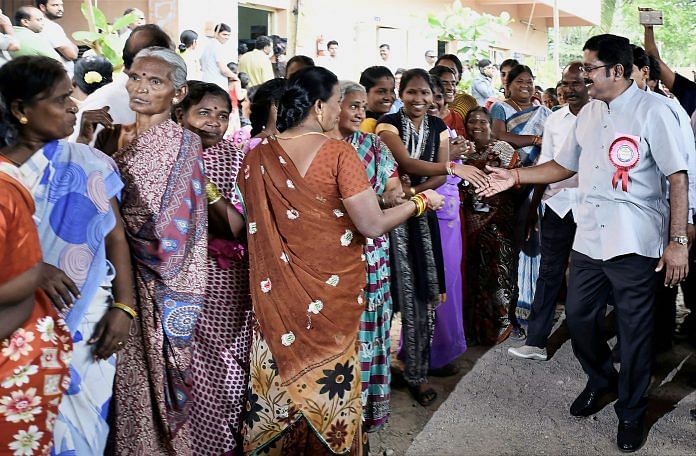BJP wants to end up with the winning side in 2019, but with Sasikala on one hand and DMK on the other, it may need to tweak its stand on corruption.
The R.K. Nagar by-election has thrown open Tamil Nadu politics in a way that will force the BJP to reassess its strategy for the state, which is vital to the party’s back-up plans for 2019.
T.T.V. Dinakaran’s win indicates that the question over former AIADMK supremo J. Jayalalithaa’s legacy isn’t a settled issue. At least, it certainly pushes back BJP’s plans to unite anti-Sasikala (Dinakaran is Sasikala’s nephew) forces under the AIADMK banner, and lay claim to Jayalalithaa’s political capital.
The result will upset the power equations within a personality driven party like the AIADMK, where Dinakaran is likely to find greater resonance, especially after contesting as an independent and managing to defeat the official candidate, Madhusudhanan.
The BJP’s sharp political strategists probably saw this coming, which is why they even opened channels with the DMK, the other big entity in Tamil Nadu politics, and got Prime Minister Narendra Modi to meet its patriarch M. Karunanidhi. They remain in contact with working president M.K. Stalin, even though the DMK has preferred to be with the Congress in the past few elections.
The 2G verdict acquitting A. Raja and Karunanidhi’s daughter Kanimozhi, however, complicates issues. The BJP had run a tough campaign on the 2G scam, sparing none in the UPA government. An acquittal of this sort has allowed the DMK to claim moral victory. The Centre’s next moves in taking forward the case by way of appeal or other measures will impact the potential of BJP’s political outreach to the DMK.
With 39 parliamentary seats, Tamil Nadu has played a key role in government formation in the Centre for the past two decades; 2014 being an exception when BJP got majority on its own for the first time, as it maximised its numbers in all its key states.
BJP’s current tally in the Lok Sabha is just about ahead of the halfway mark of 272. A minor setback, or even a slightly lower count in any of its strong states, could politically complicate matters for the BJP, both within and outside the party.
So, regardless of how the dice rolls, the BJP, as the lead national party now, will want to eventually end up with the winning side in Tamil Nadu.
But the problem for the BJP will be to accordingly adjust its anti-corruption plank. This has been one constant in BJP’s approach since the 2014 elections. In fact, it was because of this that BJP could separate Nitish Kumar from Lalu Prasad Yadav and make a comeback in Bihar, despite losing the assembly polls.
Doing business with the AIADMK without changing its line on Sasikala will be difficult after the RK Nagar polls. Similarly, it would be a challenge to attempt any understanding with the DMK without diluting the BJP’s position on the 2G case in the days ahead.
At the same time Tamil Nadu politics has also witnessed a gradual disaggregation of forces with mushrooming caste-based sub-regional parties. Combine that with cautious independent forays by superstars Rajinikanth and Kamal Haasan to test political waters, and you have the possibility of a whole new mix in the making.
Either way, what’s clear is that the 39 parliamentary seats from Tamil Nadu are allowing state actors to punch well above their weight well before the 2019 polls – a play they sorely missed in 2014.






